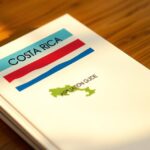Pensionado Visa: Best Option for Retirees in Costa Rica?
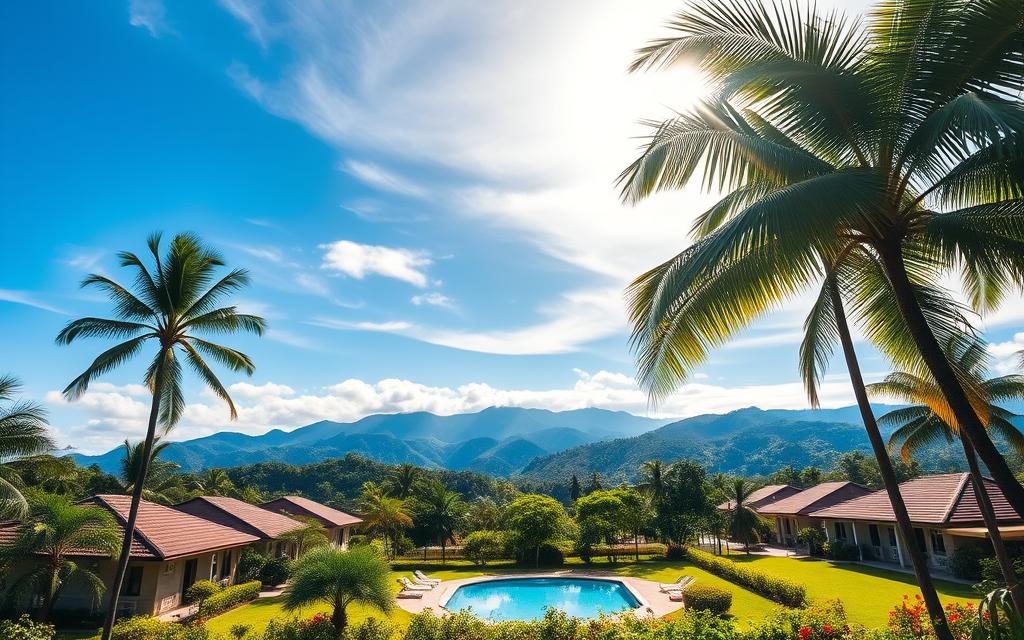
Over 120,000 Americans have chosen to call Costa Rica home. This tropical paradise offers more than just stunning beaches and lush rainforests. Its affordability and relaxed lifestyle make it a top destination for retirees.
Living costs here are about 38% lower than in the United States. A single retiree can live comfortably on $1,600 to $2,000 monthly. Couples often spend between $2,000 and $3,000. This includes housing, healthcare, and daily expenses.
One key to enjoying this lifestyle is the Pensionado Visa. It requires proof of a minimum monthly income of $1,000. This visa opens doors to numerous benefits, making retirement here both accessible and enjoyable.
From affordable healthcare to a welcoming expat community, Costa Rica offers a quality lifestyle. Its natural beauty and low cost living continue to attract retirees from around the world.
Introduction: Discovering Retirement Opportunities in Costa Rica
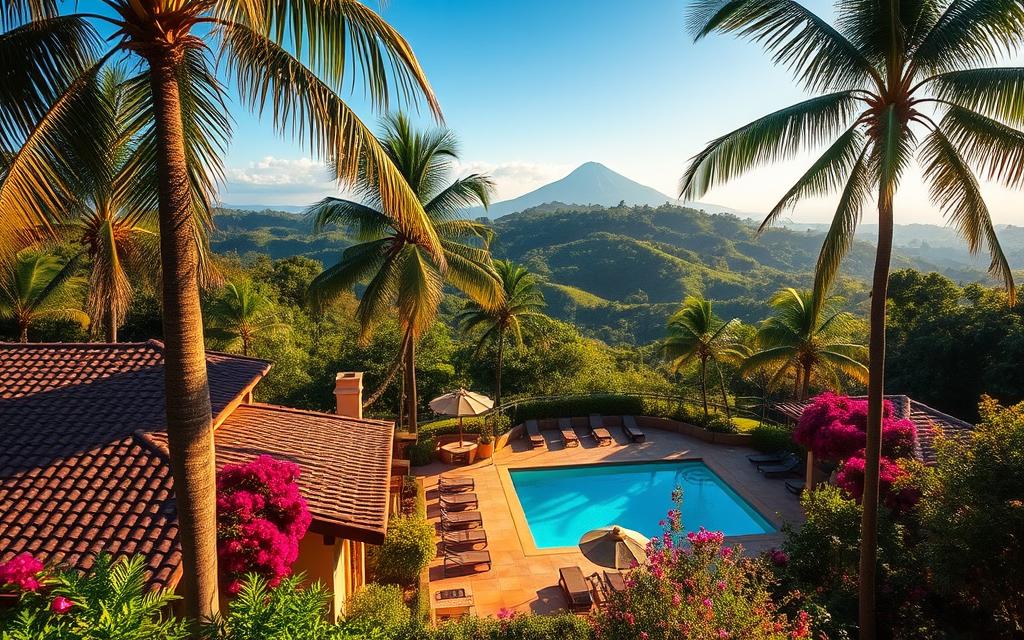
Costa Rica has become a haven for those seeking a fulfilling retirement. Its stable political and economic environment makes it a reliable choice. Retirees can enjoy peace of mind while exploring this tropical paradise.
One standout feature is the robust healthcare system. Affordable and accessible, it ensures retirees receive quality care. Many expats praise the efficiency and affordability of medical services here.
Friendly communities and vibrant cultural experiences await newcomers. From local festivals to eco-tourism adventures, there’s always something to explore. This welcoming atmosphere makes settling in easy and enjoyable.
Retirement here offers a blend of relaxation and adventure. With a lower cost of living, retirees can stretch their budgets further. This allows for a comfortable lifestyle without compromising on quality.
Whether it’s the lush rainforests or pristine beaches, Costa Rica provides endless opportunities. Retirees can embrace a fulfilling lifestyle surrounded by natural beauty. It’s no wonder so many choose to call this place home.
Overview of Costa Rica Residency Options
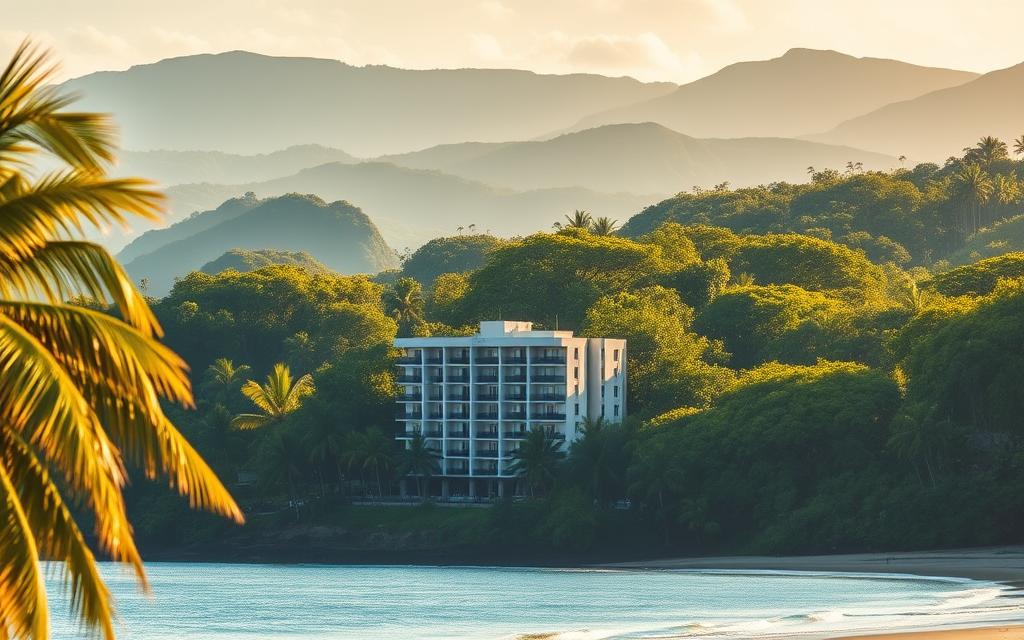
Costa Rica provides diverse residency options tailored to various financial needs. Whether you’re retiring or investing, there’s a program designed to fit your goals. Understanding these choices ensures you select the best path for your lifestyle.
One popular choice is the Rentista Program. It requires a steady monthly income of $2,500 or a $60,000 bank deposit. This option is ideal for those who don’t qualify for retirement-based residencies but still want to enjoy life here.
Another option is the Investment Residency. By investing in property or businesses, you can secure your stay. This program appeals to those looking to contribute to the local economy while building a future in Costa Rica.
Each program comes with unique benefits. For example, access to the public healthcare system is a significant advantage. It ensures quality care at a fraction of the cost compared to other countries.
Choosing the right program depends on your income, goals, and long-term plans. Explore more about these options in our detailed guide on the Costa Rica Pensionado Program. Understanding your choices helps you make the most of your retirement or investment journey.
Is the pensionado visa the best option for retirees in Costa Rica?
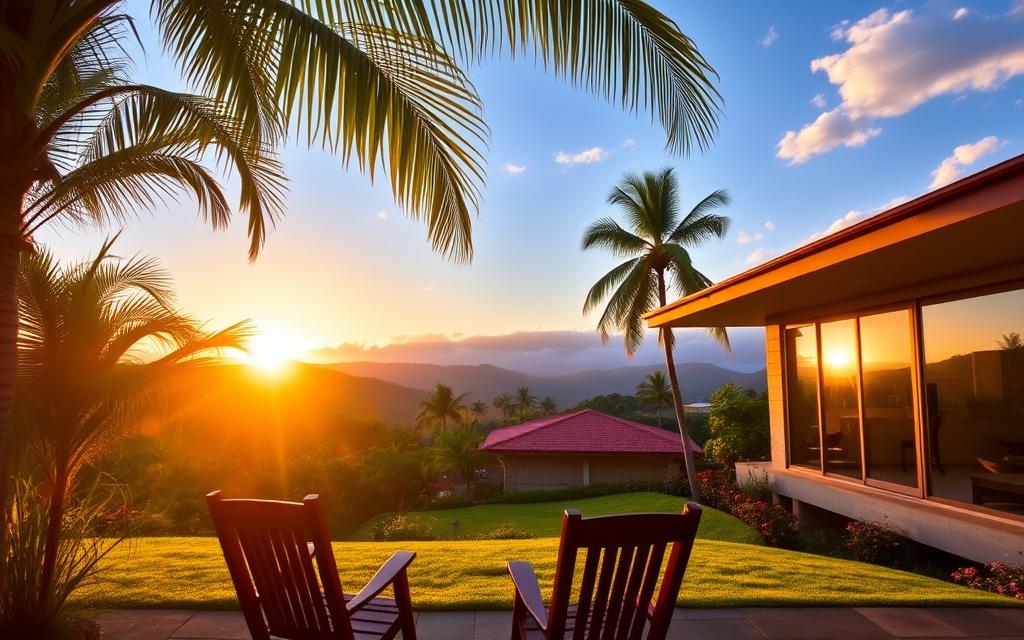
Retiring in Costa Rica offers a unique blend of affordability and adventure. One key decision is choosing the right residency program. The Pensionado Visa stands out for its low income requirement of at least $1,000 monthly. This makes it accessible for many retirees.
Compared to alternatives like the Rentista Program, which requires $2,500 monthly, the Pensionado Visa is more budget-friendly. It also opens doors to benefits like access to the country’s public healthcare system. These perks make it a popular choice among expats.
However, it’s essential to evaluate your financial situation and long-term goals. For those with higher incomes or investment plans, other options might be more suitable. The Investment Residency, for example, allows you to contribute to the local economy while securing your stay.
Ultimately, the Pensionado Visa is an excellent option for retirees seeking affordability and access to essential services. By comparing it to other programs, you can determine if it aligns with your personal circumstances. Costa Rica’s welcoming culture and low cost of living make it a top choice for many.
Understanding the Pensionado Visa Program
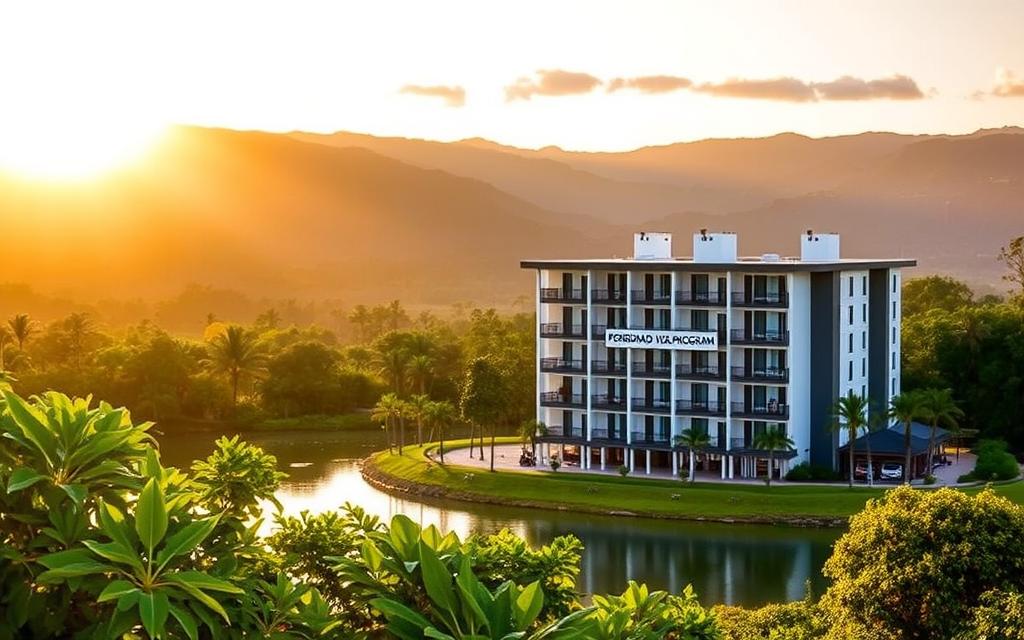
For those dreaming of a serene retirement, Costa Rica offers a welcoming environment. The Pensionado Visa Program is designed to make this dream a reality. It provides a straightforward path to residency for retirees with a stable income.
Eligibility and Income Requirements
To qualify, applicants must prove a monthly income of at least $1,000 from a pension or retirement fund. This ensures financial stability during your retirement years. Documentation includes proof of income, a clean criminal record, and other necessary paperwork.
Background checks are part of the process to ensure a smooth application. Meeting these criteria opens the door to numerous benefits. This includes access to public healthcare and tax exemptions, making retirement both affordable and secure.
Key Benefits and Advantages
One major advantage is access to Costa Rica’s public healthcare system. It offers quality care at a fraction of the cost compared to other countries. This is a significant perk for retirees looking to maintain their health without breaking the bank.
Tax exemptions on foreign income further enhance the program’s appeal. These financial perks allow retirees to stretch their savings further. The program is designed to provide a comfortable and secure lifestyle in a beautiful setting.
For more details on the application process, check out our guide on the citizenship test for over 65 in. This resource can help you navigate the requirements with ease.
The Application Process for the Pensionado Visa
Applying for residency in Costa Rica involves a clear, step-by-step process that ensures a smooth transition. Understanding each stage helps avoid delays and ensures compliance with legal requirements. This guide breaks down the process into manageable steps.
Gathering Required Documentation
Start by collecting all necessary documents. These include proof of a stable income, a clean criminal record, and valid identification. Ensure all paperwork is authenticated and translated into Spanish if needed.
Background checks are mandatory and must be completed before submission. Proper documentation is crucial for a successful application. Missing or incomplete paperwork can lead to delays or rejection.
Step-by-Step Application Guide
Begin by submitting your application at the nearest Costa Rican consulate. Include all required documents and pay the necessary fees. Fingerprinting is part of the process and is usually done at the consulate.
Once submitted, expect a processing time of around 90 days. During this period, your application will be reviewed by immigration authorities. Stay informed about your application status through regular updates.
After approval, you’ll receive your residency card. This grants access to the public healthcare system and other benefits. For more details on income requirements, visit our guide on income requirements for residency.
Following these steps ensures a smooth and efficient application process. With proper preparation, you can enjoy the benefits of living in Costa Rica without unnecessary stress.
Navigating Tax Benefits and Financial Perks
Costa Rica’s tax benefits make it a top choice for retirees. These fiscal advantages significantly enhance affordability, allowing you to stretch your savings further. Understanding these perks helps you make the most of your retirement lifestyle.
Tax Exemptions on Foreign Income
One major advantage is the exemption on foreign income. This includes pensions and Social Security payments. Retirees can keep their full payments without local taxation, ensuring financial stability.
This perk is particularly beneficial for those with income from abroad. It reduces the overall cost of living, making retirement more comfortable. These exemptions are a key reason many choose to settle here.
Import Tax and Other Fiscal Incentives
Another significant benefit is the reduction on import taxes. Retirees can bring personal belongings without hefty duties. This lowers relocation costs and makes the transition smoother.
Additional incentives include discounts on public transport and entertainment. These perks contribute to a fulfilling and affordable lifestyle. Together, they make Costa Rica an attractive destination for retirees.
Access to Costa Rica’s Public Healthcare System
Access to quality healthcare is a cornerstone of a comfortable retirement. Costa Rica’s public healthcare system, managed by the Caja Costarricense de Seguro Social (CCSS), offers extensive benefits for retirees. With a monthly income of at least $1,000, visa holders can access comprehensive medical coverage.
Enrolling in the CCSS is straightforward. Retirees contribute a percentage of their income, typically between 7% and 11%. This grants access to services like doctor visits, surgeries, and prescription drugs. The system ensures quality care at a fraction of the cost compared to other countries.
One standout feature is the universal coverage provided by CCSS. It includes preventive care, emergency services, and specialized treatments. Retirees can enjoy peace of mind knowing their health needs are covered. This is especially valuable for those with chronic conditions or requiring regular medical attention.
Cost savings are another significant advantage. Medical procedures here are often 40-70% cheaper than in the U.S. For example, a heart bypass costs around $27,000, compared to $123,000 in the U.S. These savings allow retirees to stretch their budgets further while maintaining their health.
Access to reliable healthcare enhances overall quality of life. Retirees can focus on enjoying their new surroundings without worrying about medical expenses. Costa Rica’s healthcare system is a key reason many choose to settle here.
Cost of Living and Popular Retirement Destinations
Living in Costa Rica offers retirees a budget-friendly lifestyle surrounded by natural beauty. The overall cost of living is significantly lower than in many other countries. This makes it an attractive destination for those looking to stretch their savings while enjoying a high quality of life.
Budget-Friendly Lifestyle Considerations
Monthly expenses here are manageable. Rent for a two-bedroom home near the beach can start at $950. Urban apartments are even more affordable, often costing less than coastal rentals.
Utilities, including water and electricity, average around $150 per month. Groceries typically range from $40 to $50 per week. These costs allow retirees to live comfortably without overspending.
Top Retirement Spots and Communities
Certain areas stand out for their vibrant culture and welcoming communities. Tamarindo is known for its beachfront living and expat-friendly atmosphere. Escazú offers modern amenities and a suburban feel, making it a popular choice for retirees.
Quepos, located near Manuel Antonio National Park, combines natural beauty with a laid-back lifestyle. These areas provide a mix of affordability, culture, and community, making them ideal for settling down.
Choosing the right location depends on personal preferences. Whether you prefer coastal living or urban convenience, Costa Rica has something for everyone. Its diverse culture and affordable lifestyle continue to attract retirees from around the world.
Comparing Pensionado Visa with Rentista and Investment Residencies
Choosing the right residency program can shape your retirement experience in Costa Rica. Each option offers distinct advantages tailored to different financial situations and goals. We’ll explore the differences in income requirements and unique benefits of the Pensionado, Rentista, and Investment residencies.
Differences in Income Requirements
The Pensionado program requires a minimum monthly income of $1,000 from a pension or retirement fund. This makes it an accessible choice for many retirees. In contrast, the Rentista program demands a higher income of $2,500 monthly or a $60,000 bank deposit.
For those considering the Investment residency, a minimum investment of $150,000 in local businesses or real estate is necessary. Each program caters to specific financial capabilities, ensuring there’s a suitable way for everyone to enjoy life in this beautiful place.
Unique Advantages of Each Program
The Pensionado program stands out for its low income threshold and access to public healthcare. Retirees also benefit from tax exemptions on foreign income, making it a practical choice for those on a budget.
The Rentista program appeals to individuals without a pension but with steady income. It offers a pathway to residency without requiring significant investments. This flexibility makes it a popular choice for younger retirees or those with diverse income streams.
The Investment residency is ideal for those looking to contribute to the local economy. By investing in property or businesses, retirees can secure their stay while supporting the community. This option aligns well with long-term financial goals.
Each program offers a unique way to enjoy the beauty and lifestyle of Costa Rica. By understanding these differences, retirees can make an informed choice that best suits their needs and aspirations.
Family Benefits: Including Spouses and Dependents
Families relocating to Costa Rica find comfort in the Pensionado Visa’s inclusive benefits. This program allows retirees to bring spouses and dependents, ensuring a smooth transition for the entire family. It’s a practical choice for those seeking stability and quality of life in a new environment.
Spouses and dependents under 25 can be included in the application. Those over 25 may qualify if they have physical or mental disabilities, provided proof of dependency is submitted. This flexibility makes it easier for families to stay together while enjoying the perks of residency.
One significant advantage is access to the public healthcare system. Family members can enroll in the Caja Costarricense de Seguro Social (CCSS), ensuring comprehensive medical coverage. This is a key benefit for retirees and their loved ones, offering peace of mind and affordability.
Statistics show over 80% approval rates for family sponsorship applications. Many families have successfully relocated, citing the welcoming culture and supportive community as major factors. This makes Costa Rica an ideal destination for retirees with families.
For more details on how to include your family in the residency process, visit our guide on the Costa Rica Pensionado Visa. This resource provides step-by-step information to help you navigate the application with ease.
Opportunities for Business and Investment as a Retiree
Retirees in Costa Rica often find new opportunities to grow their income and passions. Beyond enjoying the relaxed lifestyle, many explore entrepreneurial ventures or invest in local real estate. These activities not only provide financial benefits but also foster a sense of purpose and community engagement.
Entrepreneurial Ventures for Pensionados
Starting a small business is a popular choice for retirees. Options include opening a café, offering guided tours, or selling handmade crafts. The Pensionado Visa supports these initiatives by allowing retirees to invest in local enterprises. This flexibility makes it easier to turn hobbies into profitable ventures.
Real estate is another attractive option. Many retirees purchase properties to rent out or renovate for resale. With prices significantly lower than in the U.S., investing in local real estate can yield substantial returns. This also contributes to the local economy, creating a win-win situation.
Access to public healthcare ensures retirees can focus on their businesses without worrying about medical expenses. This safety net allows for greater financial freedom and peace of mind. By combining business ventures with the benefits of residency, retirees can enjoy a fulfilling and prosperous lifestyle.
Examples of successful ventures include retirees opening eco-friendly lodges or art galleries. These businesses not only generate income but also enrich the local culture. For those seeking ongoing income, entrepreneurial paths offer a rewarding way to stay active and engaged.
Practical Tips for a Smooth Transition to Costa Rican Life
Relocating to a new country requires careful planning and preparation. A well-organized approach ensures a seamless transition and helps you settle into your new lifestyle with ease. Below, we outline essential steps to make your move to Costa Rica stress-free.
Document Preparation and Professional Guidance
Start by gathering all necessary documents for your residency application. These include proof of income, a clean criminal record, and valid identification. Ensure all paperwork is authenticated and translated into Spanish if required.
Professional guidance can simplify the process. Legal experts familiar with Costa Rican immigration laws can help navigate complex requirements. They ensure your application is complete and accurate, reducing the risk of delays or rejections.
Organize your documents in a clear and accessible manner. Create a checklist to track what’s been completed and what’s still pending. This step-by-step approach minimizes stress and keeps you on track.
Navigating Legal and Tax Obligations
Understanding local laws and tax regulations is crucial. Costa Rica offers tax exemptions on foreign income, which can benefit retirees. Consult a tax advisor to optimize your financial situation and ensure compliance with local laws.
Enrolling in the public healthcare system is another important step. This requires submitting proof of residency and making monthly contributions. Access to affordable healthcare enhances your quality of life and provides peace of mind.
By following these practical tips, you can streamline your relocation process. Proper preparation and professional support make all the difference in starting your new chapter in Costa Rica.
Overcoming Common Challenges in the Residency Process
Navigating the residency process in Costa Rica can present unique challenges, but with the right approach, these hurdles are manageable. Many applicants face issues with documentation, legal requirements, or delays in processing. Understanding these challenges and preparing accordingly can make the journey smoother.
One common obstacle is incomplete or improperly formatted paperwork. Ensuring all documents are authenticated and translated into Spanish is crucial. Background checks must also be up-to-date, as outdated records can lead to delays. Professional guidance from legal experts familiar with Costa Rican immigration laws can help avoid these pitfalls.
Local communities and government agencies play a vital role in assisting new residents. Expats often find support through online forums, local expat groups, and government resources. These networks provide valuable advice and firsthand experiences, making the transition easier.
Persistence is key when facing delays or setbacks. Processing times can vary, and patience is essential. Staying informed about your application status and maintaining open communication with immigration authorities can help manage expectations.
Reassuringly, these challenges are surmountable with the right preparation. Many retirees have successfully navigated the process and now enjoy a fulfilling life in Costa Rica. For detailed guidance, refer to our detailed guide on the Costa Rica Pensionado.
By addressing potential issues proactively and leveraging available resources, you can overcome obstacles and embrace your new life in this vibrant community. Costa Rica’s welcoming culture and supportive environment make it a rewarding destination for retirees.
Conclusion
Many find a peaceful retirement in Costa Rica’s welcoming embrace. The Pensionado Visa offers financial stability, access to quality healthcare, and family benefits, making it an attractive choice. With affordable living costs and a supportive expat community, this program ensures a comfortable lifestyle.
Seeking professional guidance can simplify the residency process. Reliable sources and expert services are available to help navigate legal requirements and ensure a smooth transition. Taking this step allows you to focus on enjoying your new life.
Join the thriving expat community and embrace a fulfilling retirement in Costa Rica. For detailed guidance, explore our Costa Rica Pensionado Residency resource. Start your journey today and discover the endless possibilities awaiting you.

